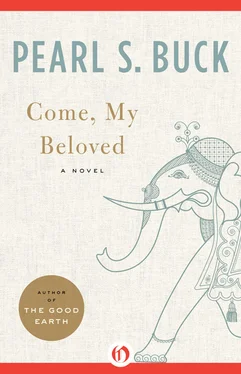Darya interrupted him. In London he had spoken like an Englishman, but here, though he used English perfectly, he spoke as an Indian, dulling the consonants and rounding the vowels.
“Your religion is not a part of your life?”
“In a way it is,” David said. He wanted to be wholly honest with Darya. He yearned for friendship, a peculiar friendship where they could speak to each other from the heart, because they were strangers to each other. He could not so speak to those whom he had always known, who knew his family and especially his father. To Darya the name MacArd seemed to mean nothing and he took wealth for granted. It was doubtful, David reflected, that all his father’s fortune could match the riches that Darya would inherit.
“How?” Darya persisted. “Tell me more, David, for I wish to know you, and to know a man’s religion is the best way to know him.”
David said, somewhat astonished, “I am afraid that it is not true of me — or of most of us. Perhaps we mean different things by religion.”
“Explain yourself,” Darya commanded with an imperious air. He had a handsome head, smoothly waved dark hair cut short about his oval beautiful face. His large brown eyes, very dark, were fixed on David’s face, and it was impossible to resist their magnetic power.
“With us,” David said diffidently, “religion is or should be expressed in practical works. It would be impossible, for us, I think, to endure or allow such poverty as you have here in your country, Darya. We would try to do something about it and that would be part of our religion.”
“What else?” Darya demanded again, his gaze not wavering.
“What else? Well, I suppose the church, its worship and so on.”
“But what of the soul?” Darya pressed. “What of the mind, the heart, the communion with God?”
“It is individual,” David said.
“You,” Darya said relentlessly, “what is it to you?”
“Not very much, I am afraid,” David acknowledged. “I have gone to church with my parents, I take communion, the bread and wine, you know. I used as a child to pray, I do not do so now. Since my mother died, I have thought about such things more than before, but I do not know how to begin to pray again. I cannot pray as a child and I do not know how to pray as a man. Indeed, I am not convinced of the reality of prayer, though certainly I believe in God, or I cannot say I do not. I have no explanation, otherwise, for the universe.”
“All this is not religion,” Darya had said thoughtfully.
It was true that one could see the lotus closing. David noticed at this moment when Darya spoke that the heavy flowers were lifting their petals slowly from the water, their movement imperceptible, yet positive, as the sun sank down behind the walls of the garden.
“Then what is religion?” he asked and turning his head he looked full into Darya’s wonderful face, so living and lighted a face, so young, so confident.
“I cannot tell you,” Darya said. “You cannot see it and yet it is everywhere. Shall you go to Benares?”
“I don’t know,” David had answered. “My father is somewhat unpredictable since my mother’s death. We are not yet accustomed to being alone.”
“You must not say she is dead,” Darya said. “I read of it in the newspapers in London and that is why I was friendly with you at once when we met. But she is not dead, she is born again.”
“We also are told that the dead live,” David said.
“Ah, but I mean really alive,” Darya said with enthusiasm, “and you need not grieve for her. You may even meet her and you should be watchful.”
“You Spoke of Benares,” David reminded him. He did not care to think of his mother living again in an unknown shape which he could not recognize, and he supposed that was what Darya meant.
“Ah yes,” Darya said, “it was only to say that there you could realize what religion is. Oh, it is a filthy city, you know, but you must remember that it is as old as Egypt, already great when Rome was founded, and that all India hopes to go there, Buddhist and Brahmin alike, to die beside the Ganges. I doubt a western city could be clean if for thousands of years millions of people had gone there to die. It is a repulsive city, I acknowledge it, it is full of beggars and fakirs, but it is also full of pilgrims and it is full of people who most earnestly seek God and with every breath and every act, so that all their life is religion. It is a place where rich men build palaces, where there are wide streets and costly clothes, this silk of my tunic was made there, and Benares is famous for its tapestries of silver and gold. In the old and narrow streets there are beggars and mangy dogs and naked children and unkempt women and peddlers of cheap stuffs and lazy sacred cows and bulls, and lepers — all the dregs of India, if you like, and yet people are driven there by the need for God. Unless you can understand — but how can you? Promise me not to go to Benares, David. I wish you to understand India, and it is there that you will or will not, and I feel your understanding is necessary to me.”
“I promise not to go without you,” David said.
The evening air, the massive lotus flowers closing their petals over their hearts, the heavy fragrance that flowed from them in the dusk, the magic silent garden spread about David an atmosphere which he had never breathed before. He had never felt so close to any human being as he now did to Darya, not even to his mother, for Darya was a man and young, his own age, and life was before them both, a different life for each, in what different worlds he well knew, and yet their need was the same.
He had longed then to be able to speak profoundly to Darya of Christianity, but he could not. He did not know enough, all that he had learned had been from others and he had nothing of his own to give. And Darya, perhaps, was feeling the same way, longing to give him, an American, the richness he believed was in Hinduism.
“Our religion,” Darya said suddenly, “does not spring from one source. Into it many religions have poured their streams, it is great enough to comprehend all and yet it has distilled something unique and individual. Some day I shall be able to explain it to you, but not yet.”
They rose, for the dusk was suddenly chill.
“The lotus flowers have closed, just as you said they would, and it is a sight that I have never seen,” David said.
“You will see it often,” Darya said. “You will come back again and again to India.”
“And you will come to America,” David replied with young warmth. “When you do, you must always stay with me.”
“When I come, if I do,” Darya said, “I will stay with you, and meanwhile we will sometimes write to each other.”
It was a promise. They walked side by side through the garden and he felt his hand taken by Darya’s hand, not closely or even warmly but delicately, kindly, as a token and only of friendship. It would have been a strange act in an American and even repulsive, but somehow it was not so here. He had often seen young Indians walking hand in hand and the act was one of brotherhood. This young Indian accepted him as a brother, and he had never had a brother. His heart stirred but he did not know what to say, and at the gate he still did not know what to say. While the gateman waited, the gate opened, he turned to Darya and put his other hand over their interlocked hands.
“I shall never forget you,” he said.
“Nor I you,” Darya said.
They had planned to meet again but there had been no other meeting and no visit to Benares. Instead his father had decided abruptly to leave India. Long ago his mother had told him never to interfere when such moments came.
“Your father is a sort of genius and you and I are not. We must be humble about it, Davie.”
Читать дальше












